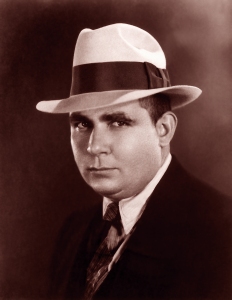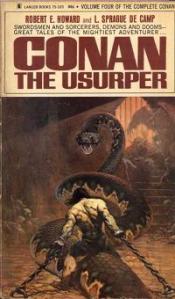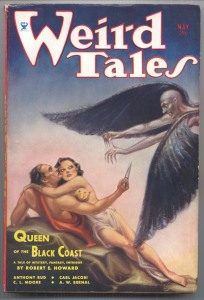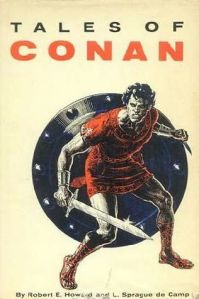Welcome to The World Apparent. A fantasy fiction blog where co-writers of fantasy series The World Apparent Tales, David Pilling and Martin Bolton, will talk about their influences and inspiration in the world of fantasy.
The very first post in The World Apparent is David’s thoughts on Robert E Howard, the creator of the iconic fantasy character, Conan The Barbarian.
Comment on this post to enter a draw for a free copy, paperback or ebook, of The Best Weapon (The World Apparent Tales Book 1) or The Path of Sorrow (The World Apparent Tales Book 2).
“They called it Cimmeria, land of Darkness and Deep night…”

Robert E Howard
This line is taken from Cimmeria, a poem written by Robert E. Howard while the author was in Mission, Texas: according to Howard, his vision of the fictional land of Cimmeria was inspired by the sight of the hill country of Fredericksburg veiled under winter mist. As many readers will know, he made Cimmeria the bleak homeland of his most famous creation, Conan. I’d like to take a look at the enduring appeal of Conan, and also shine a light on Howard’s skill and originality as a world-builder.

Howard wrote a number of short stories featuring Conan before his essay, ‘The Hyborian Age’, in which he fleshed out the background setting for his character. Written in the 1930s but not published during his lifetime, The Hyborian Age is a four-part work of genuine depth and detail, written to maintain consistency within his universe and place Conan and Kull (one of Howard’s earlier characters) inside the same chronology. Howard penned an entire history of the Hyborian era – essentially, a fictional pre-pre history of our own world before the continents broke up. The essay also described the geography of individual kingdoms and the racial characteristics of the various peoples he had invented. JRR Tolkien pulled off a similar trick in his epic sagas of Middle-Earth, but the Conan stories were first published in the early 1930s, over twenty years before the publication of Lord of the Rings. Earlier writers such as Poe and Lovecraft had created fantastical worlds, but arguably Howard was the first to create an entire self-contained universe, complete with maps and kingdoms and its own internal mythology/history.

Tolkien was an English academic, a formidable scholar and a leading author of literary criticism. His sources of inspiration are well-known: early Germanic, Norse and Old English literature, saga and poetry, all particular areas of expertise, which he drew upon to weave his Middle-Earth. In stark contrast, Howard spent all of his tragically short life in the towns of Cross Plains and Brownwood in Texas, scratching a living from odd jobs and writing short stories. The main outlet for his Conan stories was in the pulp fiction magazine Weird Tales, and he never saw any of them published in full-length book form (though a Conan novel was nearly published in 1934). Originally a poet, much of Howard’s prose has a lyrical, dreamy quality that effectively complements the raw savagery and straightforward muscular rhythms of the Conan tales. An admirer of Shakespeare, he set out his inspirations clearly in a letter from 1928:
“I have carefully gone over, in my mind, the most powerful men – that is, in my opinion – in all of the world’s literature and here is my list: Jack London, Leonid Andreyev, Omar Khayyam, Eugene O’Neill, William Shakespeare. All these men, and especially London and Khayyam, to my mind stand out so far above the rest of the world that comparison is futile, a waste of time. Reading these men and appreciating them makes a man feel life is not altogether useless.”

“Life is not altogether useless.” Here is an example of the deep angst lurking in Howard’s mind. Generally reckoned to be a depressive, he took his own life in 1930, shortly after his mother slipped into her final coma. Since his death many writers have tried to write further adventures of Conan, and none (for my money) have succeeded in recapturing the verve of the original stories. Perhaps this is because Howard poured so much of his own identity in them. He wrote westerns as well as heroic fantasy, most of them dominated by swaggering, capable alpha males in the Conan mould. As a teenager, Howard was a keen amateur boxer as well as addicted to severe regimes of exercise. These were intended to make him outgrow his skinny teenage frame and become more of a ‘man’, as he saw it: cutting down trees, lifting weights, punching a bag and springing exercises. Characters such as Kull, Conan and Solomon Kane, fearless warriors who could not be beaten in a straight fight, were his exemplars. They are also, Conan especially, morally ambivalent men, largely driven by self-interest. Conan performs a great many heroic deeds, but there’s nothing altruistic about them: he thirsts for gold, women, adventure, someone else’s blood on his sword. This ambivalence serves to make the character far more interesting than a straightforward, Superman-type hero, and may explain the character’s deathless appeal. Perhaps Howard’s own darkness, the self-destructive demons in his soul, are reflected in the stark nature of his most popular creation.
CIMMERIA
“It was gloomy land that seemed to hold
All winds and clouds and dreams that shun the sun,
With bare boughs rattling in the lonesome winds,
And the dark woodlands brooding over all,
Not even lightened by the rare dim sun
Which made squat shadows out of men; they called it
Cimmeria, land of Darkness and deep Night.
It was so long ago and far away
I have forgotten the very name men called me,
The axe and flint-tipped spear are like a dream,
And hunts and wars are like shadows. I recall
Only the stillness of that sombre land;
The clouds that piled forever on the hills,
The dimness of the everlasting woods.
Cimmeria, land of Darkness and the Night.”
Article by David Pilling
Love those final verses there. And Weird Tails.
Thanks David.
LikeLike